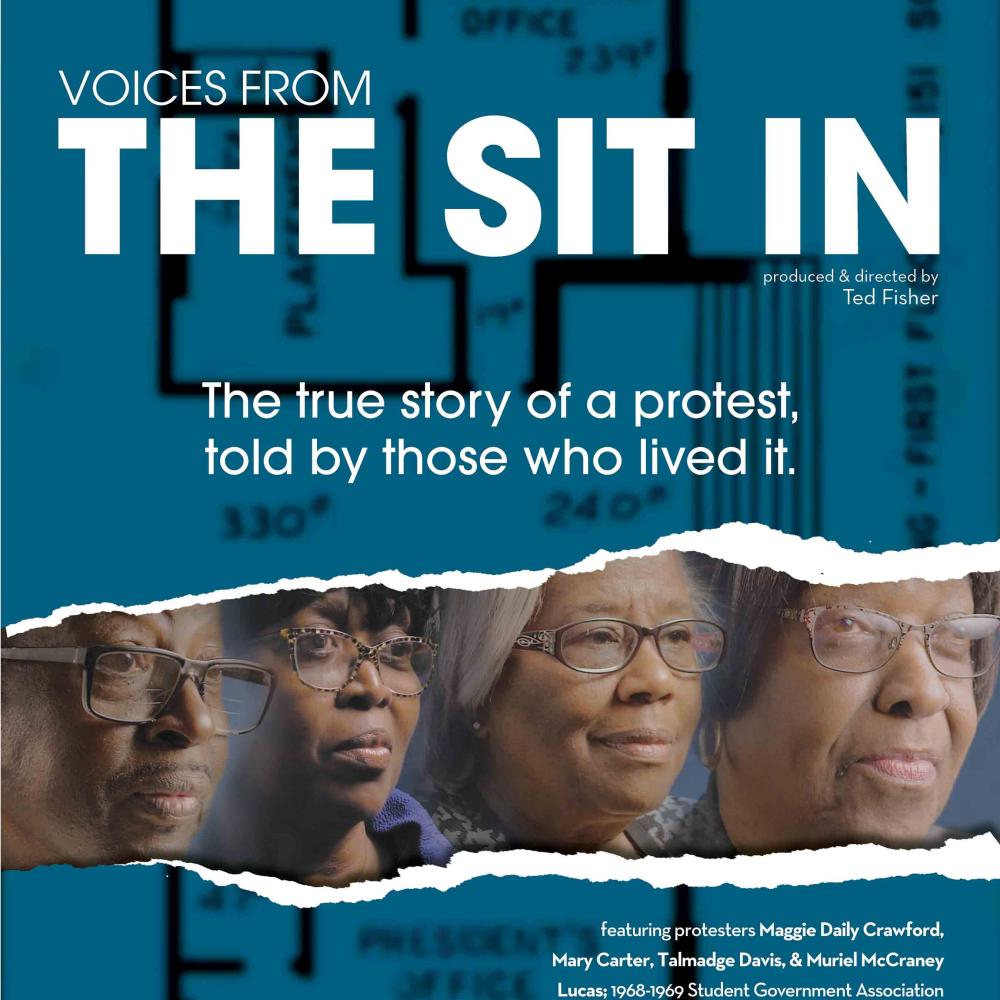It was not easy being a Black student at Delta State College (now Delta State University) in the late ’60s. A few years earlier, the school had enrolled its first African-American students, yet they made up only 3 percent of the student body and reported being ostracized and discriminated against in the classroom. To advocate for better treatment, the Black Student Organization was founded. In spring 1969, the group presented a list of ten demands to the administration, including that professors no longer use racial slurs in the classroom, that a fair grading system for Black students be implemented, and that two Black professors be hired for the faculty.
The Black Student Organization held protests across campus, culminating in a sit-in by 52 students in front of the office of college president James M. Ewing, who some called the “ogre of Kethley” (the name of the building where his office was). In response, Ewing had all the students arrested by Mississippi highway patrolmen, who came armed with submachine guns and dogs. The arrested students were taken to Parchman, a state penitentiary, and spent the night on death row.
A 2009 article in the Delta State University alumni magazine reported that the sit-in was a seminal moment in the history of the school. It was “the first step toward transforming the previously all-white institution into a campus that is acknowledged today as Mississippi’s most diverse.” Despite this, the university had almost no information on the sit-in except for a lone box of papers found in the back of a filing cabinet.
The school hosted a fortieth anniversary commemoration of the sit-in that same year, which eventually led several faculty members—including Arlene Sanders, an instructor in political science, and Carrie Freshour, now an assistant professor at the University of Washington who worked at DSU—to begin collecting oral histories from those arrested and those who witnessed the events.
Ted Fisher, who teaches video production and documentary filmmaking at DSU, arrived at the school in 2019 and heard about the oral-history project from colleagues, who asked him to film a few of the subjects.
Fisher recalls, “It very quickly became obvious, once we had people in the studio, that telling their story in person was really amazing.”
The result is Voices from the Sit In, a short, award-winning documentary supported by Mississippi Humanities that tells the story from the perspective of then-student activists Maggie Daily Crawford, Mary Carter, Talmadge Davis Jr., and Muriel McCraney Lucas, among others.
Another interview was with James W. Powers, president of the student government association in 1969. Powers remembers running to the Kethley building as soon as he heard about the sit-in and seeing more than a dozen police with submachine guns. “You’re overcome with the courage,” Powers says of the protesters. “They weren’t batting an eye. They weren’t going to move.”
The students were quickly arrested and loaded onto a bus. McCraney Lucas remembers the moment they realized they weren’t being taken to the city jail. “When the bus moved beyond downtown and beyond the city limits of Cleveland, [Miss.] we just began to whisper among ourselves,” she says. “And somebody said, ‘They’re taking us to Parchman.’”
Mississippi State Penitentiary, also known as Parchman Farm, was notorious in the 1960s for being where the state government sent Freedom Riders to break their spirits and work on chain gangs. Freedom Riders showered once a week; got no mail, pencils, paper, or books; and were strip-searched on arrival. When the Delta State students met with the warden, he took a much kinder tone, but they were still subjected to a search, although not made to completely undress. Even 50 years later, Crawford and Lucas struggle to talk about the humiliation.
“I still see the face of the woman who searched me. The search was quick, it was thorough, but there was no privacy,” says Lucas. “And I just remember how I felt less than.”
The students were housed overnight on death row to keep them away from the general population. The warden handed out decks of cards and suggested they try to make it feel like a sleepover. The students passed the night playing games and singing freedom songs, until the other prisoners told them to be quiet.
The next day, the students were taken back to Cleveland for court. Lucas was staring out of the bus window as they stopped in front of the courthouse. “The yard was full of Black people,” she recalls. “When I got off the bus and went to the halls, the halls were full of Black people. When we walked up to the courtroom, the courtroom was full of Black people.”
People she didn’t know had come with the deeds to their homes because the students would be released from jail only with property bonds. “[People] were prepared to put up whatever they had so we didn’t spend another night in jail,” she says. “When I’ve heard people say things such as, ‘Black people don’t stand together,’ I think, ‘Yes we do.’ Because the yard and the courtroom and the halls were full of people who did not know me personally but who had decided, ‘I don’t care what she did. If I can keep her from going to jail another minute, I’m prepared to do that.’”
Sykina Butts is an associate producer on the documentary and was a junior at Delta State when she became involved with the oral-history project. She first found Powers, one of the interviewees, while she worked at the university’s alumni drive phone-a-thon. As she worked more on the oral histories, Butts was surprised to find out how little of the sit-in story was actually part of university records.
“I go back to what Ms. Muriel Lucas said in one of our interviews,” says Butts, who recently graduated. “We are the only people that are told to forget our history.”
In addition to Butts, more than a dozen students worked on the film, from home and over Zoom after COVID-19 hit. They finished in March 2021. The film has been featured in six film festivals, including Fort Smith International Film Festival, where it won the Best Documentary Short Film award, and the Deep in the Heart Film Festival, where it was nominated for Best Documentary Short. The school also received the 2020 Elbert R. Hilliard Oral History Award from the Mississippi Historical Society for the documentary.
In October 2021, the team was able to finally show the film on campus, just a stone’s throw from where the original protest took place. More than 500 people attended the screening. Many were moved to tears.
“That sort of brought into perspective that this is not just a film,” Fisher says. “This was a community remembering an issue that was important, still is important, and will continue to be part of Mississippi history.”


